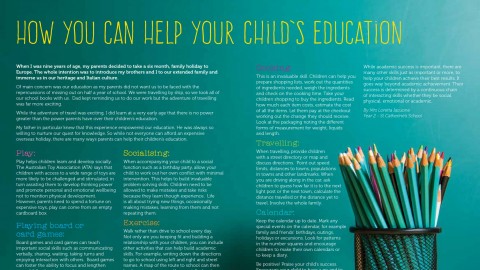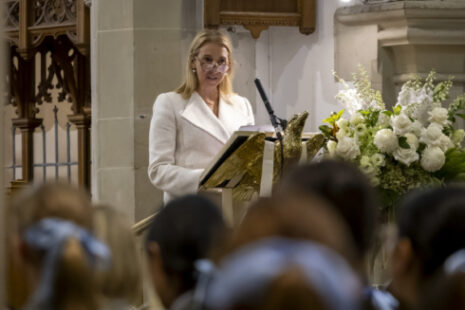How You Can Help Your Child’s Education

Article published in MAMAMAG, July Edition 2016, pages 24 and 25:
When I was nine years of age, my parents decided to take a six month, family holiday to Europe. The whole intention was to introduce my brothers and I to our extended family and immerse us in our heritage and Italian culture.
Of main concern was our education as my parents did not want us to be faced with the repercussions of missing out on half a year of school. We were travelling by ship, so we took all of our school books with us. Dad kept reminding us to do our work but the adventure of travelling was far more exciting.
While the adventure of travel was exciting, I did learn at a very early age that there is no power greater than the power parents have over their children’s education. My father in particular knew that this experience empowered our education. He was always so willing to nurture our quest for knowledge. So while not everyone can afford an expensive overseas holiday, there are many ways parents can help their children’s education.
Play: Play helps children learn and develop socially. The Australian Toy Association (ATA) says that children with access to a wide range of toys are more likely to be challenged and stimulated, in turn assisting them to develop thinking power and promote personal and emotional wellbeing not to mention physical development. However, parents need to spend a fortune on expensive toys, play can come from an empty cardboard box. Playing board or card games: Board games and card games can teach important social skills such as communicating verbally, sharing, waiting, taking turns and enjoying interaction with others. Board games can foster the ability to focus and lengthen your child’s attention span by encouraging the completion of an enjoyable game.
Socialising: When accompanying your child to a social function such as a birthday party, allow your child to work out her own conflict with minimal intervention. This helps to build invaluable problem solving skills. Children need to be allowed to make mistakes and take risks because they learn though experience. Life is all about trying new things, occasionally making mistakes, learning from them and not repeating them.
Exercise: Walk rather than drive to school every day. Not only are you keeping fit and building a relationship with your children, you can include other activities that can help build academic skills. For example, writing down the directions to go to school using left and right and street names. A map of the route to school can then be drawn or vice-versa. You can talk about distance and perhaps time yourself with a goal to improve your timing to get to school.
Cooking: This is an invaluable skill. Children can help you prepare shopping lists, work out the quantities of ingredients needed, weigh the ingredients and check on the cooking time. Take your children shopping to buy the ingredients. Read how much each item costs, estimate the cost of all the items. Let them pay at the checkout working out the change they should receive. Look at the packaging noting the different forms of measurement for weight, liquids and length.
Travelling: When travelling, provide children with a street directory or map and discuss directions. Point out speed limits, distances to towns, populations in towns and other landmarks. When you are driving along in the car, ask children to guess how far it is to the next light post or the next town, calculate the distance travelled or the distance yet to travel. Involve the whole family.
Calendar: Keep the calendar up to date. Mark any special events on the calendar, for example family and friends’ birthdays, outings, holidays or excursions. Look for patterns in the number squares and encourage children to make their own calendars or to keep a diary.
Be positive! Praise your child’s success. Encourage your child to have a go and to investigate and make discoveries for themselves. Encourage them to find their own answers. Do not be too quick to tell them the answers. While academic success is important, there are many other skills just as important or more, to help your children achieve their best results. It goes way beyond academic achievement. Their success is determined by a continuous chain
of interacting skills whether they be social, physical, emotional or academic.





